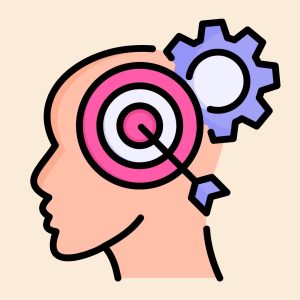Where is Your Focus?
The concept of “you get what you focus on” suggests that your thoughts, attention, and energy significantly influence your outcomes. What you consistently focus on – whether consciously or unconsciously – tends to shape your reality, behaviours, and results. This principle draws from psychology, neuroscience, and personal development, emphasising the power of intentional focus in achieving successful outcomes as well as mental and emotional fitness.

Focus Directs Attention:
The human brain has a limited capacity for processing information. When you focus on something specific, your brain prioritises it, often filtering out other possibilities and distractions.
Example: If you focus on emotional resilience, you’re more likely to notice strategies and resources that enhance your well-being. Conversely, focusing on stress may amplify feelings of overwhelm.

Focus Shapes Behaviour:
Your attention drives your actions. Focusing on productive and emotionally enriching outcomes often leads to intentional efforts, while focusing on fears and failures may lead to procrastination and avoidance.
Example: An athlete focusing on winning a race, channels their energy into disciplined training, while one focusing on failure might cause hesitation and self-sabotage.

Focus Amplifies Results:
Sustained focus creates momentum. Whether you’re building emotional strength or mastering a new skill, consistent attention compounds over time, producing tangible outcomes.
Example: Professionals focusing on work-life balance are better positioned to cultivate both personal satisfaction and career success.
The Role of a Coach in This Concept
A coach can help you harness the power of focus effectively, ensuring it aligns with your personal development and your mental and emotional fitness. Here’s how:
A coach helps you define clear, meaningful objectives so your focus aligns with what truly matters.
Example Question: “What areas of your life need the most emotional support and attention in the next 6 months?”
A coach helps you identify where your focus currently lies (e.g., on negative emotions, distractions, and unproductive habits) and guide you in shifting toward more empowering areas.
Example Exercise: A coach may ask you to journal your thoughts and emotional triggers over a week to identify patterns.
Negative focus often stems from limiting beliefs and fears. A coach helps reframe these beliefs, enabling you to focus on possibilities, emotional growth, and strengths.
Example:
Client: “I feel stuck thinking about my past mistakes.”
Coach: “What lessons did those mistakes teach you, and how can they guide your future?”
A coach helps maintain your focus by setting priorities, tracking progress, and holding you accountable for your commitments.
Example: A coach might ask, “What will you commit to focusing on this week, and how will we measure your progress?”
Through mindfulness exercises, visualisation techniques, and structured planning, a coach helps train your mind to focus effectively and consistently.
Example Tool: Creating a “focus board” with visual reminders of your key goals.
It’s natural to lose focus or encounter setbacks. A coach helps you realign your focus after distractions and failures, ensuring long-term consistency and emotional strength.
Example: After a stressful week, a coach might ask, “What coping strategies worked well, and how can you integrate them moving forward?”
Increased Clarity: Understand what truly deserves your focus.
Improved Productivity: Channel your energy into high-impact areas that foster both success and well-being.
Reduced Distractions: Learn to filter out noise and stay aligned with your intentions.
Stronger Resilience: Bounce back faster when focus wains and emotions fluctuate.
Enhanced Outcomes: Achieve results that align with your values, well-being and values.
By guiding you to keep focus intentionally and consistently on the right things, a coach empowers you to move past obstacles, unlock your potential, and create meaningful, balanced success.
Daily Intentions
Develop your focus today by paying attention to your thoughts, feelings, and actions. Here are three simple and effective daily intentions to sharpen focus:
- Clarify Priorities: What is the most important task I need to focus on today?
- Minimize Distractions: What distractions can I reduce or eliminate to stay focused?
- Maintain Attention: How will I stay present and focused on the task at hand?

Reflective Questions
Here are three reflective questions to assess your focus at the end of the day:
- What did I focus on most today, and did it move me closer to my goals?
- What distractions pulled me away, and how can I manage them better tomorrow?
- When was my focus strongest today, and what helped me stay locked in?
Wellbeing Check
,The importance of completing your wellbeing check today is to focus on the positive empowering achievements of your day. By asking yourself the following positive, empowering questions you are telling your unconscious mind to focus on these opportunities in your day to day routine. This is another step toward sharpening your focus.
Click below to complete today’s Wellbeing Check:
Well done today, you will thoroughly enjoy Day 3 tomorrow, The Power of Language.
Progress Tracker
